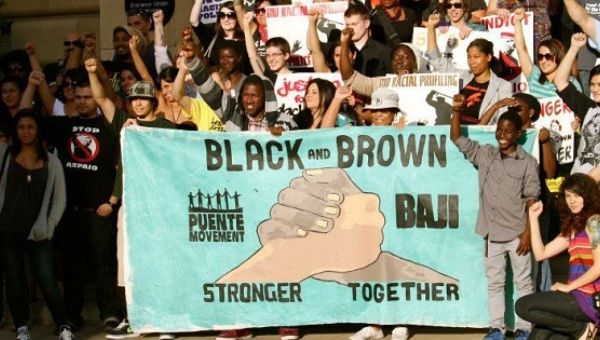- About
- Topics
- Picks
- Audio
- Story
- In-Depth
- Opinion
- News
- Donate
-
Signup for our newsletterOur Editors' Best Picks.Send
Read, Debate: Engage.
| October 30, 2017 | |
|---|---|
| topic: | Racism |
| tags: | #Black History Month, #National Union of Students UK (NUS), #Civil Rights Movement |
| located: | United Kingdom |
| by: | Federica Tedeschi |
Black History Month has celebrated its 30th anniversary in the UK this year. The precursor to this event was however created in 1926 by Dr. Carter G. Woodson in the United States, to commemorate the births of Abraham Lincoln and Frederick Douglass for a whole week in February, and to highlight the power of education for African Americans. It took 50 years for the US government to finally recognise the event and expand celebrations to an entire month.
Young students have the chance to learn what figures like Martin Luther King, Malcom X and many others have achieved. There is however a plethora of Black History Month activities organised by schools, universities, media, councils and organisations as well as unions up and down the UK. On the agenda we can find debates, conferences, workshops, film screenings, art exhibitions and the list goes on.
Among many initiatives, the National Union of Journalists (NUJ) and its Black Members’ Council hosted ‘Claudia Jones memorial lecture’ to celebrate the life and work of the journalist, (she was also a black rights campaigner and mother of both Notting Hill Carnival and the West Indian Gazette, one of the first black newspapers in Britain). She made a significant contribution to society in the early struggle for racial equality, and worked throughout her short life to promote revolutionary politics. Guest speaker Diane Abbott MP highlighted how media often misrepresent people of colour, while recalling that in her previous career as a journalist in broadcasting, she was probably the only black face in the newsroom and not much has changed thirty years later.
“There may be more black and brown faces on the screen these days, but those with power, the people who make all the decisions on which stories are chosen and how they are framed, are white journalists from privileged backgrounds”, Ms. Abbott stressed.
Black history month is also held in Canada and is well-known worldwide, however, the experience of being black is different in every country.
A set of testimonies from black British women interviewed by lifestyle platform Black Ballad shows that being black British is ‘kind of having two identities’, in fact, it is the same as ‘being part of the community while remembering and honouring their own roots’.
Black people have been in the UK for a long time and they have contributed to the country’s prosperity. Why are they still underrepresented and often misrepresented?
A group of young members of the National Union of Students UK (NUS) interviewed in October 2014 highlighted how the problem lays in the fact that we still live in a western-centered world. A student pointed out that learning history in Britain is all about European culture, and that even at university there is often a Eurocentric conception of world politics; this attitude can be a serious problem in our globalised world.
According to Robbie Skillman, reader in International Relations in Queen Mary, London: “In many ways black history is one of the quintessential histories of humanity because they actually get to the very basis of what humanity is about. And it is only in the 1960’s that people in the British colonies stopped becoming British subjects”.
Black History Month is essential in promoting learning, providing information and contributing to community cohesion.
Lord Ouseley, a member of the House of Lords engaged in a number of charitable activities and a black immigrant himself, still has a vivid memory of those threatening words from a group of adults in the streets of south London in the late 1950’s, warning him that the English people had not won the war for people like him to go there and take their jobs and homes.
Mr. Ouseley feels strongly about Black History Month and believes that ‘for the past 30 years it has shone, and continues to shine, a beacon of light on the facts about black history, heritage, legacy and the on-going struggles for equality and justice. More than that, it educates, informs and inspires the black community each day of the year to be proud of who they are and to understand their history, their origins, why they are in the UK and their right to stay and exist as equals’.
Previous U.S. Presidents Barack Obama, when still representing the country where it all began, declared: “We pay tribute to the contributions of past generations and reaffirm our commitment to keeping the American dream alive for the next generation. In honor of those women and men who paved the way for us, and with great expectations for those to follow, let us continue the righteous cause of making America what it should be, a nation that is more just and more equal for all its people”.
By copying the embed code below, you agree to adhere to our republishing guidelines.
